- Home
- Courtney Milan
Trial by Desire
Trial by Desire Read online
Praise for USA TODAY bestselling author
COURTNEY MILAN
and Proof by Seduction
“One of the finest historical romances I’ve read in years. I am now officially a Courtney Milan fangirl.”
—New York Times bestselling author Julia Quinn
“A brilliant debut…deeply romantic, sexy and smart. I couldn’t put it down.”
—New York Times bestselling author Eloisa James
“Historical romance fans will celebrate Milan’s powerhouse debut, which comes with a full complement of humor, characterization, plot and sheer gutsiness.”
—Publishers Weekly (starred review)
“A dazzling debut by a multitalented author who thrills readers with a twist on a traditional plot and truly unforgettable characters.”
—RT Book Reviews
“With a tender, passionate romance, a touch of sly humor, and a gruff and incredibly sexy hero, Courtney Milan’s Proof by Seduction is a delicious read from the first page all the way to the very satisfying ending.”
—New York Times bestselling author Elizabeth Hoyt
“Sexy, hilarious, and deeply, deeply touching. Courtney Milan writes with the keenest understanding of the heart. It is a cliché to say so, but I laughed and I cried. And I cannot wait to read her next book.”
—Sherry Thomas, author of Private Arrangements (a Publishers Weekly Best Book of 2008)
“Courtney Milan is a blazing new talent in the romantic stratosphere…Warm, witty, wonderful and wise, Proof by Seduction will steal your heart away.”
—Anna Campbell, multiple-award-winning author of Tempt the Devil
Dear Reader,
If you are anything like me, you’ve done something in your past that you wish you could forget. No matter how successful you may be, you still remember that one time (if you’re me, it’s more like those twenty-seven times) you did that really embarrassing thing.
You desperately hope nobody else remembers.
Ned Carhart, the hero of this book, has made mistakes in his past. Those of you who read my first book, Proof by Seduction, already have some idea what I’m talking about, but if you haven’t, rest assured you’ll find out soon enough.
Imperfect as Ned was, I knew those same mistakes would make him an extraordinary hero once he had time to mature. He would be strong, sensitive…and very, very determined to prove that he’d moved beyond his past.
I give all my books code-names as I am writing them. This book was called “Dragon Slayer,” even though there are no dragons in it. I hope you have fun finding out why!
Courtney Milan
COURTNEY MILAN
Trial by Desire
Also available from
COURTNEY MILAN
and HQN Books
Proof by Seduction
And coming in spring 2011
Unveiled
Acknowledgments
I’ve heard before that second books are hard. This one was…very hard. I am first and foremost grateful for all the readers who contacted me demanding Ned’s story. Without your encouragement and enthusiasm, I might have given up on this.
As always, I am deeply grateful for Tessa and Amy, who offered support, encouragement and advice. Elyssa Papa and Kris Kennedy gave valuable feedback on various drafts. Franzeca Drouin saved me from about a billion errors. Nancy, my mother-in-law, answered a thousand questions about horses for me. And Kim Castillo truly is an author’s best friend.
Kristin Nelson, my awesome agent, and all the Nelson Agency staff—Sara Megibow, Julie Kerlin, Anita Mumm, and Lindsay Mergens—provided the absolute best support an author could want.
A great many people who put up with my whining about this book: the Pixie Chicks, the Vanettes, the Bon Bons, and my favorite debut loop ever.
Margo Lipschultz, my wonderful editor, provided the proper balance of encouragement and gentle prodding, and Ann Leslie Tuttle let me know when I was going off the rails. I wish I had space to thank everyone on the entire team at Harlequin by name for the amazing job they have all done launching my career—from the extraordinary sales force, to the marketing department, to the editorial enthusiasm at HQN Books—but that would take pages and pages.
And last but never least, there’s my husband, who never once complained about my writing while he did the dishes, made me dinner and took care of the dog.
Trial by Desire
For Teej. Because when I had to make Ned a hero, I gave him a little bit of you.
Contents
PROLOGUE
CHAPTER ONE
CHAPTER TWO
CHAPTER THREE
CHAPTER FOUR
CHAPTER FIVE
CHAPTER SIX
CHAPTER SEVEN
CHAPTER EIGHT
CHAPTER NINE
CHAPTER TEN
CHAPTER ELEVEN
CHAPTER TWELVE
CHAPTER THIRTEEN
CHAPTER FOURTEEN
CHAPTER FIFTEEN
CHAPTER SIXTEEN
CHAPTER SEVENTEEN
CHAPTER EIGHTEEN
CHAPTER NINETEEN
CHAPTER TWENTY
CHAPTER TWENTY-ONE
CHAPTER TWENTY-TWO
CHAPTER TWENTY-THREE
CHAPTER TWENTY-FOUR
EPILOGUE
AUTHOR’S NOTE
PROLOGUE
London, 1838
LADY KATHLEEN CARHART had a secret.
Truth be told, she had more than one—but the secret she had in mind as she sat across from her husband at breakfast had arrived only today. It was wrapped in paper and had been set carefully atop her chest of drawers. And if her husband knew what it was…
She suppressed a faint smile.
Across the table from her, he set the paper down and fixed his gaze on her. His eyes were a liquid brown, three shades beyond her breakfast chocolate. They stood out, uncannily dark against the sandy brown of his hair. He had no notion what it did to her when he looked at her like that. Her toes curled. Her hands clasped together. All he had to do was look at her, and she found herself wishing—wanting—no, desiring. And therein lay the root of her problem.
“I had a talk with my cousin a few days ago,” he said.
Around London, a thousand couples might have been having a similarly prosaic conversation. Kate’s mother had cautioned her to be practical about marriage, to accept that she and her husband would share a genteel, friendly politeness.
But then, Kate hadn’t married the average London gentleman. Mr. Edward Carhart did nothing properly or politely—nothing, that was, except his newly acquired wife.
“What did Blakely have to say?” Kate asked.
“You know that some of our holdings are in the East India Company?”
“Aren’t everyone’s? It’s a good investment. They trade in tea and silk and saltpetre….” Her voice trailed off into roughness.
If he’d known what flitted through her mind when she said the word silk, he’d not sit there so sanguine. Because she’d purchased a filmy night rail on Bond Street. It was made of imported silk and fastened together in front by means of lavender ribbons. Those scraps of opaque fabric were perhaps the garment’s only concession to modesty. It lay on her chest of drawers, simply beseeching Kate to wear it one evening.
“Silk,” Ned said, looking off into the distance without seeing her lean forward, “and other things. Like opium.”
“Opium was not on my shopping list.”
He didn’t smile. Instead he glanced away as if uncomfortable. “In any case, Blakely and I were talking about the recent events in China.” Ned shook his paper at her. “And we decided it would behoove someone to personally inquire into what was going on over there.”
For once, he s
ounded serious. Kate frowned at him. “By someone, you mean Mr. White, and by over there, you mean the office on—”
“By someone,” Ned said distinctly, “I mean me, and by over there, I mean China.”
He set the newspaper down and bit his lip. The morning sun suddenly seemed too bright. It blasted in from the window behind him, casting his features into shadow. She couldn’t make out his eyes. He had to be joking. At any moment, he was going to grin at her.
She gingerly relinquished her hold on her teacup and essayed a small smile. “Have a lovely journey. Will you be home in time for tea?”
“No. The Peerless is leaving St. Katharine’s at noon, and I intend to be on it.”
Not just the light was blinding. She raised her eyes to him, and his sincerity finally penetrated. “Oh, God. You really meant it. You’re leaving? But I thought—”
She’d thought she had time for that silk night rail, folded carefully in paper.
He shook his head. “Kate, we’ve been married three months. We both know that the only reason we wed was because people found us alone together and imagined more had happened. We married to stave off the scandal.”
Put so baldly, her impractical hopes sounded even more foolish than she’d supposed.
“The truth is,” he continued, “neither of us is ready to be married, not really.”
Neither of them?
He stood and pushed back his chair. “I’ve never had the chance to prove myself to anyone. And…” He trailed off, his hand scrubbing through his hair. “And I want to.”
He set his serviette atop his plate and turned around. The world swirled around Kate.
He was walking away, as if this had been normal breakfast conversation on a regular day.
“Ned!” Kate vaulted to her feet. The word seemed as like to hold back the breaking floodwaters of her marriage as the insubstantial silk gown waiting upstairs.
His shoulders tensed, two sharp blades beneath the wool of his coat. He stopped in the doorway on the verge of escape.
She didn’t have the words to capture the cold tremor that ran through her. She settled on “I wish you wouldn’t. I wish you would stay.”
He tilted his head, just enough to see her over his shoulder. For just that one second, he looked at her the way she’d dreamed about: with a deep hunger, an almost open yearning, as if she were more to him than a name written under his on their marriage license. He exhaled and shook his head.
“I wish,” he said quietly, “I could, too.” And then he turned and left.
She wanted to run after him, to say something, any thing. But what rooted her in place was a realization. He was as restless as she’d once been.
And she knew well enough that she couldn’t fill that up, not with any number of silken gowns.
At least this way he could imagine her quiet and practical, not hurt in the slightest by his leaving. She’d kept the secret of her attraction all too well, wrapped up in paper.
She’d kept all her secrets, and it was too late to explain.
CHAPTER ONE
Berkshire, three years later
A SHOULDER-HIGH WALL hugged the dirt road that wound its way up the hill Kate was climbing. Last night, when she and the nursemaid had crept by on foot, the dark stones of the wall had seemed menacing, hunched things. She’d imagined Eustace Paxton, the Earl of Harcroft, crouching behind every rock, ready to spit vile curses at her.
But through the diffuse morning fog, she could see little yellow-headed wildflowers growing between the rocks. Even this aging edifice had become friendly and bright. And Harcroft was thirty miles away, in London, unaware of her involvement in his latest misfortunes. She’d won a respite, and for the first time in two weeks, she breathed easily.
As if to belie her certainty, the plod of horse hooves carried to her on a breeze. She turned, her heart accelerating. Despite the flush of heat that rose in her, Kate clutched her heavy cloak about her. She’d been discovered. He was here…
There was nothing behind her but morning mist. She was imagining things, to think that Harcroft would have uncovered her secret so quickly. She let out a covert breath—and then gulped it back as the creak of wooden wheels sounded once more. This time, though, it was evident that the noise came from up the road. As she peered ahead of her, the dark form of a cart lumbering up the hill resolved in the mist.
The sight was as calming as it was familiar. A blanket of fog had obscured the sound’s origin. The cart moved slowly, drawn by a single animal. As Kate trudged up the hill, her calves burning with the exertion, she made out more details. The conveyance was filled with heavy wooden kegs, marked with a sigil she could not make out from here. The animal that pulled this cargo seemed some nondescript color, unidentifiable in the mist. From this distance, its coat appeared to be both spotted and striped with light gray. It strained uphill, bone and muscle rippling underneath that oddly colored pelt.
Kate sighed with relief. The man was a common laborer. Not Harcroft; therefore, not someone who posed a threat if he discovered the role she’d played last night. Still, Kate pulled her hood up to shield her face. The scratchy wool was the only disguise she had.
As if in reminder of the nightmare that Louisa had escaped, a whip-crack sounded in front of her. Kate gritted her teeth and continued up the hill. Half a minute later, and a number of yards closer, the whip cracked again. She bit her tongue.
She had to be practical. Lady Kathleen Carhart might have had sharp words for the man. But right now Kate was wrapped in an ill-fitting cloak, and the servant she was pretending to be would keep her eyes downcast. A servant would never speak up, not to a man with a horse and a whip. He would never believe her the lady of the manor, not dressed as she was.
And besides, the last thing Kate needed if she intended to keep her secrets was for society to hear that she’d been skulking about, dressed as a servant. As she climbed the hill, the lash continued to fall. She gritted her teeth in fury as she drew abreast of the cart. Perhaps that was why, at first, she didn’t hear it.
Above the complaining rumble of the cart wheels, the noise had been at first indiscernible. But the wind shifted, and with it brought the rhythmic sound of a gentle canter to her ears.
Kate glanced behind her. A horseman was coming up the hill.
A simple carter might once have caught a glimpse of Lady Kathleen at a harvest festival—a close enough look to boast, over a tankard of ale, perhaps, about seeing a duke’s daughter. He wouldn’t recognize her when she was swathed in a heavy cloak and a working woman’s bonnet.
But a man on horseback could be a gentleman. He might, in fact, be the Earl of Harcroft, come looking for his missing wife. And if Harcroft came upon Kate dressed in this fashion—if he recognized her—he might guess the role she’d played in his wife’s disappearance.
All he would have to do was trace her path back a few miles. That shepherd’s cottage wasn’t so very far away.
Kate pulled the hood of her cloak farther over her eyes and slunk closer to the wall. Her hand brushed against grit on its uneven surface. Even though she huddled in her cloak, she set her chin. She was not about to surrender Louisa to her husband. No matter what he said or did.
The man on horseback came into view through the mist just as Kate crested the hill. Shreds of fog splashed around his horse’s hooves, like gray, slow-moving seawater. The horse was a gentleman’s beast: a slim mare, gray as the wisps of vapor that clung to its legs. Not Harcroft’s chestnut stallion, then. Reassured, Kate studied the gentleman himself.
He wore a tall hat and a long coat; the tails flapped behind him in rhythmic counterpoint to the fall of his mare’s hooves. Whoever he was, his shoulders were too broad to belong to Harcroft. Besides, this man’s face was covered by a sandy beard. Definitely not Harcroft, then. Not any man she recognized.
That didn’t mean he wouldn’t recognize her, or that he wouldn’t carry stories.
Slowly she let out her breath and turned to look forwar
d. If she didn’t draw attention to herself, he wouldn’t notice her. She looked like a servant; she would be virtually invisible to a man of his class.
The mare’s light hoofbeats pattered up the hill. It moved in effortless contrast to the other poor animal, which was still dragging its Sisyphean burden to the summit. But Kate had her own burden to concentrate on. Out of the corner of her eye she saw the horseman pull ahead of the cart. The tails of his coat flapped briefly across the beast’s blinkered vision. A foot or so of fabric; nothing more.
The horse pulling the cart, however, stopped and shied, pinning its ears against its head in a gesture of equine distress. Kate pressed against the wall as the cart’s wooden shafts creaked. Another flap of the coattails in the wind; when the whip cracked again, Kate winced. The carter’s horse did more than that: it let out a frightened cry and reared up on its hind legs. The cart tilted precariously; the hooves thundered down. Kate heard the crashing splinter of wood, and she whirled to face the animal.
One of the cart shafts had split down the middle. The horse was tangled in halter and traces, and no matter how it strained, it could not escape. When frightened, horses ran; and when they couldn’t run—
Kate caught a glimpse of a dark eye rolled back, ears flattened against the long head. The horse’s blinkered gaze momentarily fixed on hers. Crack went the whip, and the horse reared in response. It was so close, Kate could see its iron shoes as it pawed the air above her head. She felt frozen in that moment, as useless as a rabbit cowering in the grass with a hawk plummeting down. Her hands went cold. Her mind moved sluggishly. She might have counted the horse’s ribs, every prominent ridge, as the hooves descended toward her.

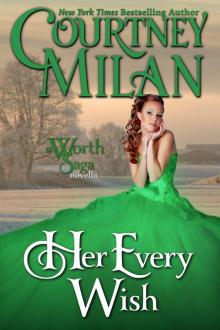 Her Every Wish
Her Every Wish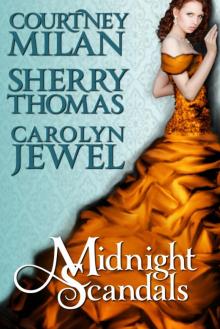 Midnight Scandals
Midnight Scandals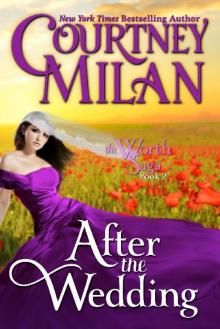 After the Wedding
After the Wedding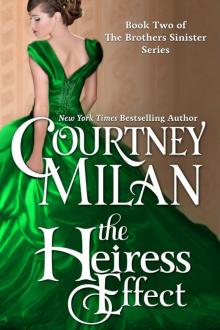 The Heiress Effect
The Heiress Effect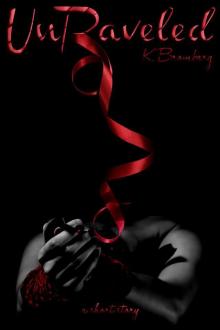 Unraveled
Unraveled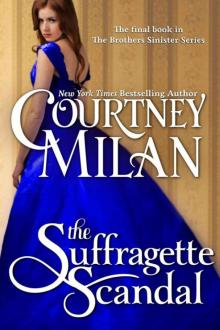 The Suffragette Scandal
The Suffragette Scandal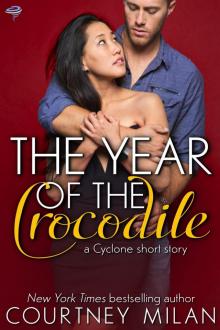 The Year of the Crocodile
The Year of the Crocodile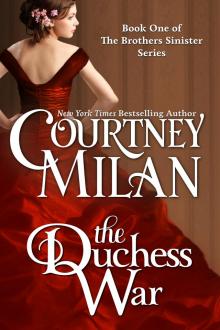 The Duchess War
The Duchess War What Happened at Midnight
What Happened at Midnight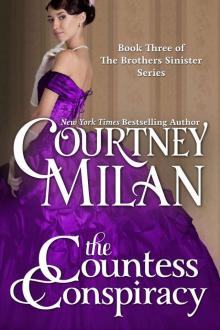 The Countess Conspiracy
The Countess Conspiracy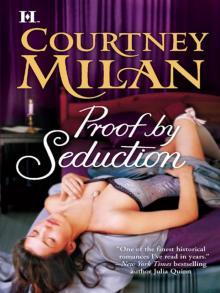 Proof by Seduction
Proof by Seduction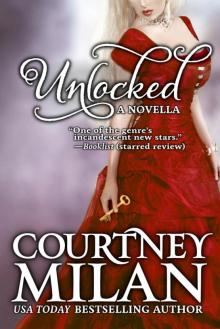 Unlocked
Unlocked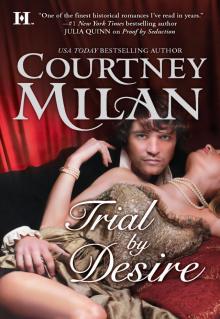 Trial by Desire
Trial by Desire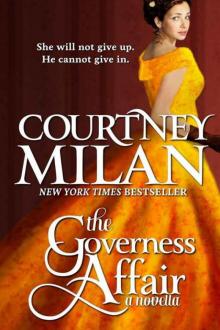 The Governess Affair
The Governess Affair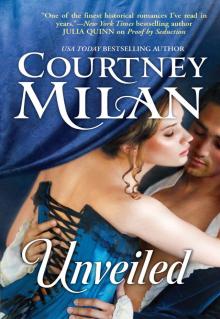 Unveiled
Unveiled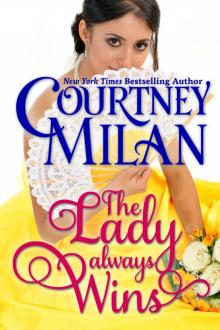 The Lady Always Wins
The Lady Always Wins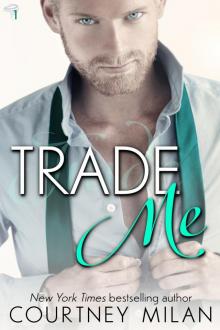 Trade Me
Trade Me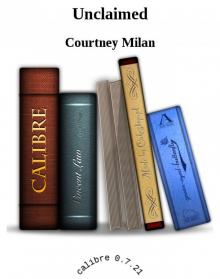 Unclaimed
Unclaimed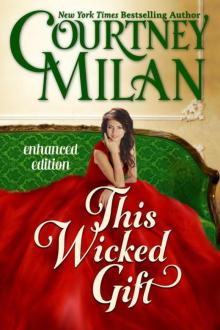 This Wicked Gift
This Wicked Gift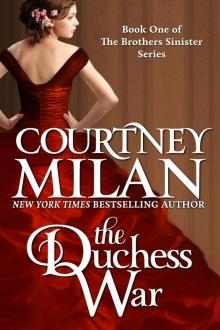 The Duchess War (The Brothers Sinister)
The Duchess War (The Brothers Sinister)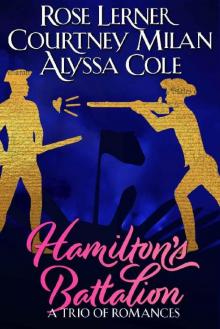 Hamilton's Battalion: A Trio of Romances
Hamilton's Battalion: A Trio of Romances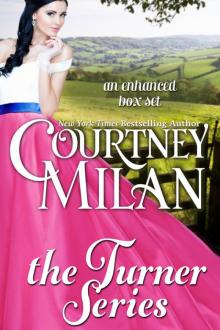 The Turner Series
The Turner Series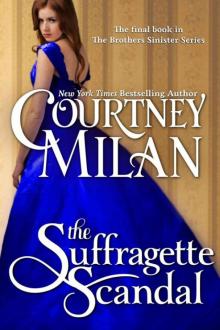 The Suffragette Scandal (The Brothers Sinister)
The Suffragette Scandal (The Brothers Sinister)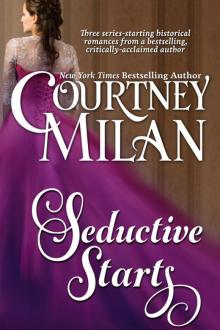 Seductive Starts
Seductive Starts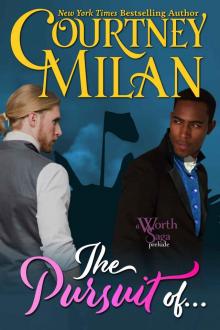 The Pursuit Of…
The Pursuit Of…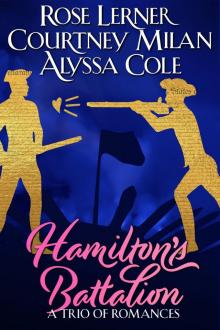 Hamilton's Battalion
Hamilton's Battalion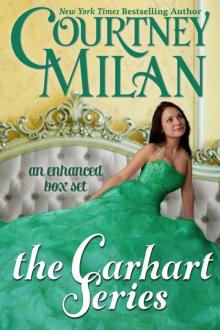 The Carhart Series
The Carhart Series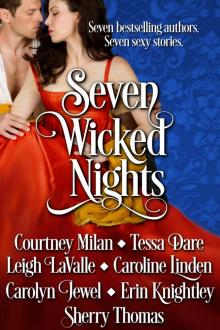 Seven Wicked Nights
Seven Wicked Nights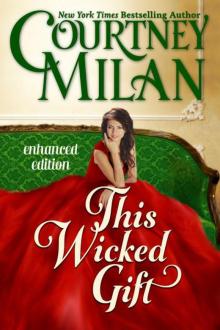 This Wicked Gift (A Carhart Series Novella)
This Wicked Gift (A Carhart Series Novella)